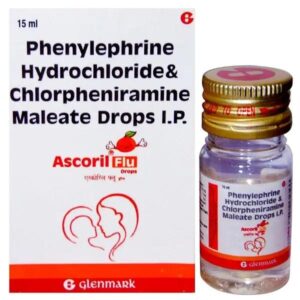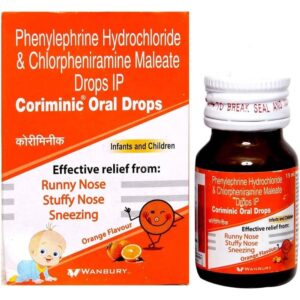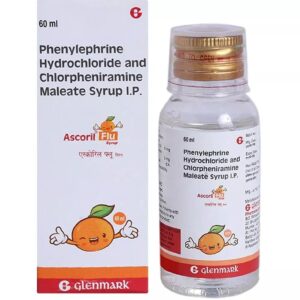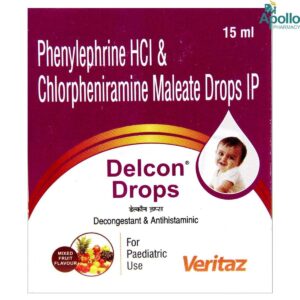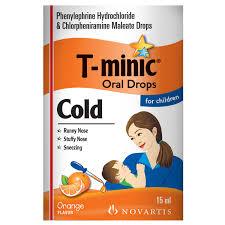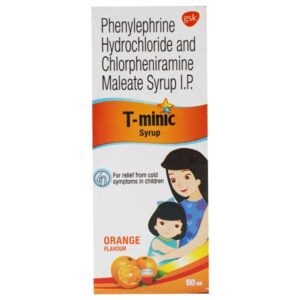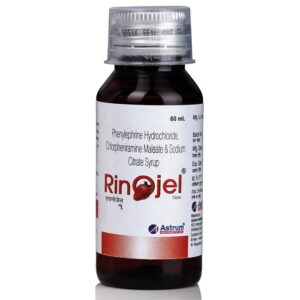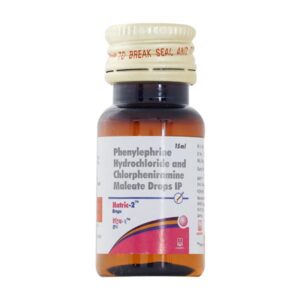CHLORPHENIRAMINE + PHENYLEPHRINE
Chlorpheniramine: Chlorpheniramine is an antihistamine drug that is used to relieve symptoms of allergies, such as itching, sneezing, and runny nose. It is also sometimes used to treat symptoms of the common cold.
The mechanism of action of Chlorpheniramine involves blocking the action of histamine, a substance produced by the body during an allergic reaction. Histamine is responsible for causing itching, sneezing, and other allergy symptoms. By blocking histamine receptors, Chlorpheniramine helps to alleviate these symptoms.
The typical dose of Chlorpheniramine for adults is 4 mg to 8 mg every 4 to 6 hours. For children, the dose is based on weight and usually ranges from 1 mg to 2 mg every 4 to 6 hours. It is important to follow the dosage instructions provided by a healthcare professional or as directed on the medication label.
While Chlorpheniramine is generally considered safe, it may cause some side effects. Common side effects may include drowsiness, dizziness, dry mouth, blurred vision, constipation, and urinary retention. These side effects are usually mild and temporary. However, individuals should exercise caution when operating machinery or performing tasks that require alertness, as Chlorpheniramine can cause drowsiness.
Additionally, it is important to note that Chlorpheniramine may interact with certain medications, such as sedatives, tranquilizers, and monoamine oxidase inhibitors (MAOIs). It is important to inform a healthcare professional about all medications being taken to avoid potential interactions.
As with any medication, it is recommended to consult with a healthcare professional before starting Chlorpheniramine to determine the appropriate dosage and to discuss any potential risks or interactions.
Phenylephrine: Phenylephrine is a medication that is commonly used as a decongestant to relieve nasal congestion or stuffiness caused by conditions such as the common cold, allergies, or sinusitis. It can also be used to treat low blood pressure during certain medical procedures or shock.
The mechanism of action of phenylephrine involves its ability to constrict the blood vessels in the nasal passages, which helps to reduce swelling and congestion. It works by activating alpha-adrenergic receptors on the smooth muscle in the blood vessels, causing them to contract and narrow. This constriction increases the resistance to blood flow and decreases the volume of blood flowing through the blood vessels, thereby reducing congestion.
Phenylephrine is available in various forms, including oral tablets, nasal sprays, eye drops, and injections. The dose and administration route will depend on the specific condition being treated. It is important to carefully follow the instructions provided by the healthcare professional or the instructions on the product label.
Like any medication, phenylephrine can potentially cause side effects. The most common side effects include a temporary burning or stinging sensation in the nose or eyes, headache, dizziness, increased blood pressure, and increased heart rate. These side effects are usually mild and go away on their own. However, if any severe or persistent side effects occur, it is important to seek medical attention.
It is worth noting that phenylephrine should be used with caution in individuals with certain medical conditions, such as high blood pressure, heart disease, diabetes, thyroid disorders, glaucoma, or prostate problems. Additionally, it may interact with other medications, so it is important to inform your healthcare provider about all the medications you are taking before starting phenylephrine.
In summary, phenylephrine is a decongestant medication that is commonly used to relieve nasal congestion. It works by constricting the blood vessels in the nasal passages, reducing swelling and congestion. It is available in various forms and should be used as directed. Common side effects are generally mild and temporary, but it is important to be aware of potential interactions and to seek medical attention if severe or persistent side effects occur.

